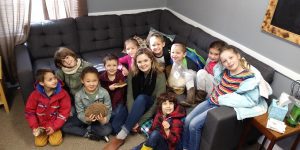By: Rebecca Roberts


I walked in the room. The kid asked me, “Who are you?”
So honest and forward. It’s funny, because I thought I’d have a chance to introduce myself to the kids. I was worried they wouldn’t listen to me or how I would introduce myself. I was so worried that what I explained to the kids wouldn’t make sense.
I’m Becca Roberts and I’m a senior Interdisciplinary Studies major studying Marketing for Integrative Health here at Plymouth State University. A recent Friday I spoke at a NH based Co-Op with kids ages 4-8. They were a group of home-schooled kids who meet in a shared space to have class time every week. I found this opportunity on a NH based mycological community page, Monadnock Mushroomers Unlimited.
The kids saw the spread of dried mushrooms I brought to their classroom and quickly became obsessed with touching, holding, observing the mushrooms specimens I brought in and immediately thought I was pretty cool. I had planned on doing the craft I had prepared first, but they were so excited about the physical mushroom specimens I brought in. I just passed them out and let the kids feel, hold and observe the specimens. The room filled with excitement and it was so wonderful to see. After this experience, feeling like I should switch gears to focus more on simply being present and trusting the process.
I honestly don’t know why I was so worried about what I would say and what I wouldn’t say. What I should have said to myself is, Becca you got this. You know this stuff. Naturally, I started pointing out the different parts of the mushroom I had growing in the bag. Then, I had the teachers helped me pass out the materials I had for the mushroom craft I brought in with me. The kids, ages 5-8 were distracted by the new craft project put in front of them. I expected this to happen and I intentionally did it anyway. I wanted them to be distracted and I wanted them to have something fun, before I started talking about the mushroom life cycle and all things fungi. I figured that kids get talked at a large part of the day and I, someone closer to them in age than their teachers and the same age as some of their siblings, wanted to talk with them.
I asked the kids, “Do you know what the difference between a mushroom and a plant is?” Some said that it dies, some said that it’s simply gone and others said that more mushrooms would grow. I explained to them how a mushroom life exists predominantly under the ground in the mycelium, and that by picking the mushroom, they were actually spreading spores and helping the mushrooms spread. Then, I showed them a gif of mushrooms spreading spores when hit with rain. They got to see nature’s way of ensuring longevity of fungi in real time; the gifs were most of the more fascinating parts of the talk to the kids. In these moments, the entire classroom was captivated, asking, Can I see? Can I see? Things seemed to really get it. One kiddo then asked, “how do mushrooms grow?”
At this point, I proceeded to discuss the different types of relationships mushrooms can have with plants and trees. I asked them, “What kinds of things do you look for in a friend?” One child said kindness, another said sweetness. To which I responded, “What I look for in a friend is someone who helps me and who I can grow with,” connecting that mushrooms and trees are friends. Mycorrhizal relationships are mutually beneficial relationships between trees, plants and mushrooms and basil exist like a beneficial friendships based off of the idea that you help me and I help you.
Include these anecdotes show that talking to children about a complicated field of study, Mycology, required an understanding so thorough l I could draw patterns for the kids in their own lives. This is something that takes mastery of a topic; something I was unaware of until I thought, how do I talk to children this young about something so vast and complex?
They really seemed to understand the connections I made. I had 45 minutes total to give the talk. After about 25 minutes we were done with our craft and I was done with what I had prepared to talk about. I made the mistake of telling the kids, “this is all I have for you today.” I realized that was a mistake when the kids started to put their jackets and backpacks on. What I learned is that in talking to such young children, as an adult, there’s a need to be extremely thoughtful and intentional. We ended up spending the rest of the time exchanging mushrooms facts and looking through the books I brought in to show the class. I underestimated how intrigued the kids would be at the various different fungi depicted in the books. We used the latter part of the class to interact and communicate which was valuable for myself, the kids and the teachers.
Click for link to original article.
Becca Roberts is an Interdisciplinary Studies major and a CoLab Student Affiliate. Read more about Becca here.


